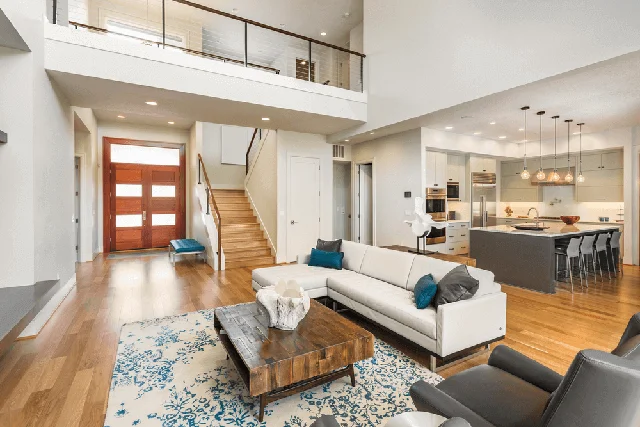Decorate with Area Rugs
If you’re looking to update and revitalize a room in your home quickly, easily and inexpensively, consider using an area rug. A decorator rug is a furnishing and home-decorating product. While rugs serve a practical function as a floorcovering, they have the ability to transform the look and feel of every room and are great for a quick solution to problems with your existing carpeting.
With more and more homes using wood or tile flooring, area rugs have seen an increase in popularity, as they can protect hardwood floors or wall-to-wall carpeting. Rugs also have the ability to tie elements of a room together.
An area rug is an excellent way to instantly warm the room up too. They can add a great dramatic color and design to every room. They define a seating arrangement beautifully, in a sense creating an island in the room to make it more intimate and inviting. You can change rugs when the seasons change and take them with you if you move.
Decorator rugs are popular with all home do-it-yourself decoraters.
Rug Colors and Patterns
Color is always the most important facator when decorating. Your chosen color or pattern of rug should act as a contrast to the already existing theme and elements within that room or area. If your room has a great deal of bright and bold colors, choose a neutral color and a subtle design for the rug. If the colors of the room are soft and neutral, you can add interest with a bright rug and a dramatic design.
When choosing the pattern on the rug, remember it must not clash with patterns on the wallpaper, window coverings, cushions, and any other fabrics in the room. Dark colors add warmth, and light colors will make the room appear more spacious. Also consider the amount of traffic through the room or area. If there are children or pets, or the rug will get steady use, dark colors and intricate patterns will not show dirt as much or as quickly as light colors.
Rug Sizes and Shapes
A great tip when deciding on rug shape and size is to use masking tape to define the space, to help you vizualize the rug in the room. You could also lay sheets.
When an area rug is to be used to cover most of the floor, the same amount of bard floor space should be exposed on all sides of the rug. If your room is irregular in shape, try to arrange furniture to extend to the rug sides. And if this is not possible, ensure at least two parallel side are exposing the same of amount of floor space.
For a rug that is defining an area, there should be no more than than two feet of empty rug extending out from behind the furniture. A rug used for defining is unifying the items placed around it if the rug is large enough to accommodate at least the front legs of each piece of furniture.
A rug for a dining room, should extend eighteen inches to twenty-four inches beyond the table, with generally an eight- by ten-foot rug working in most living rooms and dining rooms. For small areas, such as coffee tables a six- by four-foot or a six- by nine-foot rug is sufficient.
Rug Theme and Characteristics
Contemporary rugs come in every variety of color, design, texture, size, and price.
Consider a rug with a central medallion, if the rug is to be the focal point of a room. If the medallion will be hidden for the most part by a piece of furniture, select a rug that has an allover design, or one with detail on its borders.
Oriental rugs are a term which refers to rugs from any Asian country that are popular in modern as well as traditional homes.
A round braided rug, would suit a North American theme. Using a Navajo rug, with its geometric designs and flat weave, can reinforce a southern or desert theme.
Other Rug TipsMaintenance is an important consideration when choosing rugs not only for the bathroom, but also the kitchen, the hall, or the room of a child. Select designs and colors that donít show the dirt, and are stain resistant and easy to clean.
It is a good idea to add padding under a rug because it will not only keep the rug from moving, it will also extend its life, absorb sound, and make vacuuming easier. If you are placing a rug over wall-to-wall carpeting, choose a thin under-pad coated with an adhesive.




